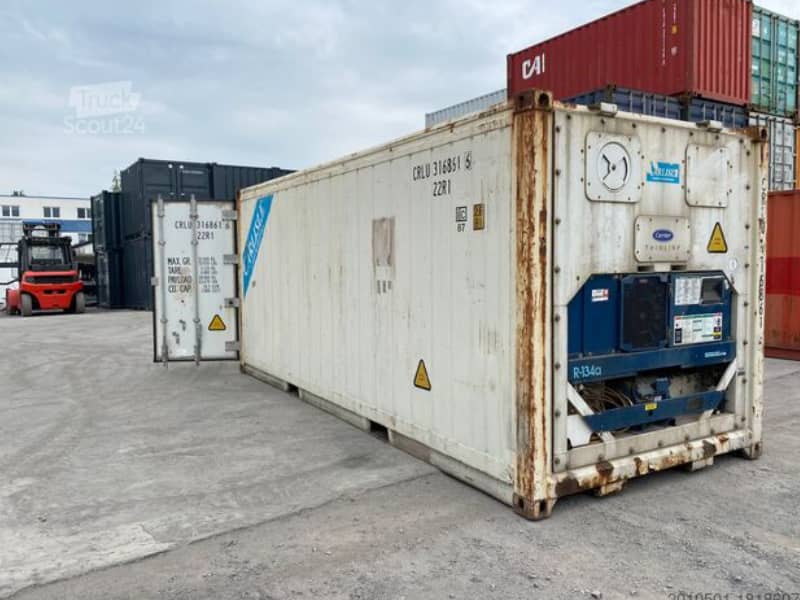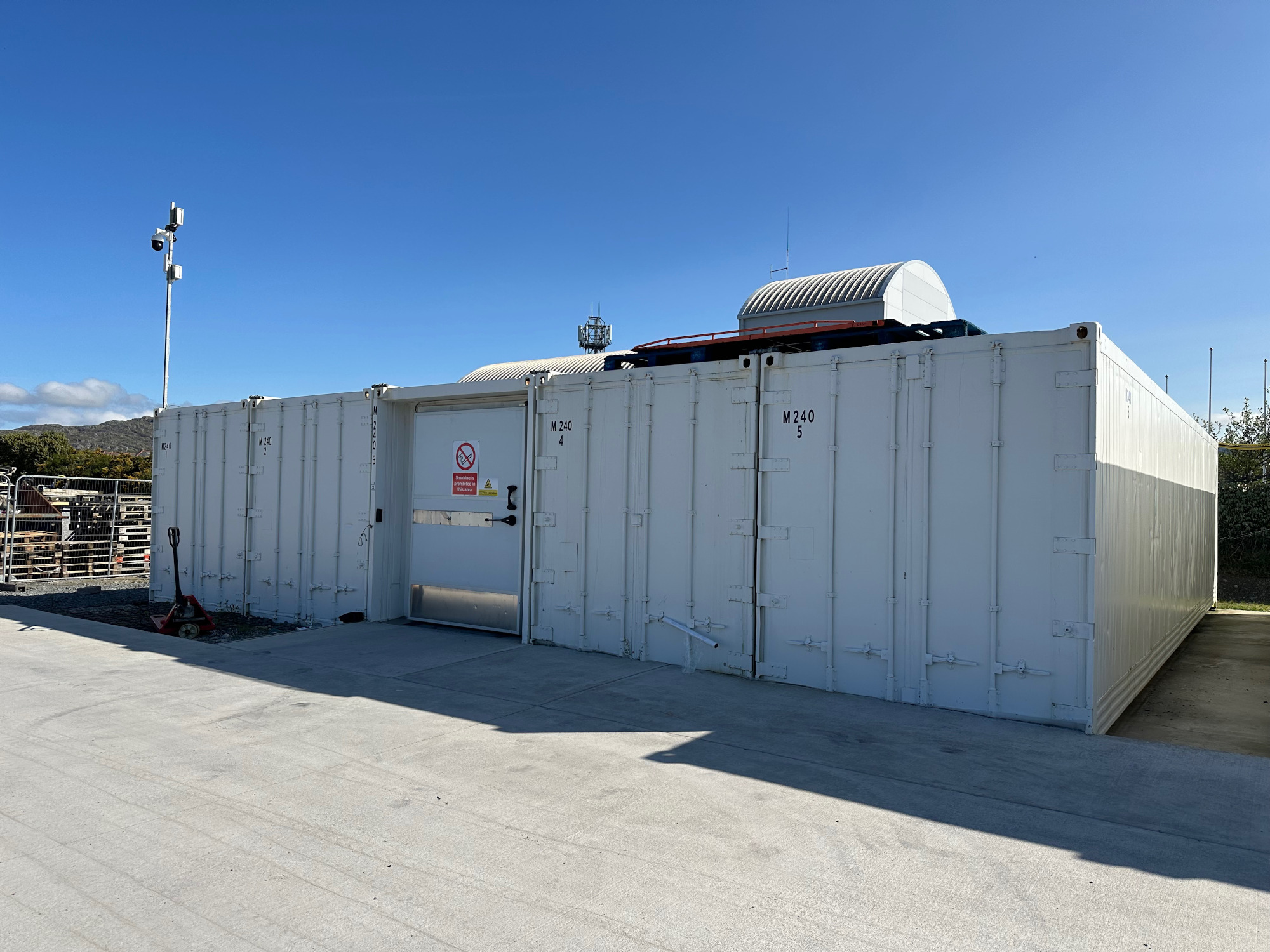Everything About Cold Store Containers: Crucial Insights for Your Storage Space Needs
Freezer containers play a vital role in the preservation of disposable products. They can be found in various kinds, including refrigerated and protected units, each developed for specific storage needs. Comprehending the benefits and key attributes of these containers is vital for companies aiming to maximize their procedures. As the need for effective storage space services expands, discovering the different alternatives readily available can result in informed decisions that influence both productivity and sustainability. What variables should one think about when picking the appropriate container?
Kinds Of Cold Storage Space Containers
Cold store containers come in various types, each designed to meet details temperature control demands. Among the most usual types are refrigerated containers, which keep temperatures in between 0 ° C to 10 ° C, making them suitable for perishable goods like fruits, vegetables, and milk products. Another kind is the deep fridge freezer container, which runs at temperatures below -18 ° C, ideal for long-lasting storage space of frozen products such as meats and fish and shellfish.
Insulated containers supply temperature stability without active air conditioning, making them valuable for temporary transportation of temperature-sensitive products. Additionally, there are portable cold store units, which use versatility in locations and are typically utilized in occasions or seasonal operations. Blast chillers quickly lower the temperature level of warm foods, guaranteeing safety and quality. Each kind serves an unique purpose in various sectors, from food service to pharmaceuticals, highlighting the importance of picking the right container for specific storage requirements.

Benefits of Making Use Of Freezer Solutions

Moreover, freezer remedies extend the rack life of items, minimizing waste and raising productivity for companies. By effectively taking care of supply with proper temperature level control, business can optimize their supply chains and boost functional efficiency.
Furthermore, freezer facilities permit flexible storage space options, accommodating various quantity requirements and seasonal variations popular (used 40ft refrigerated shipping containers). This adaptability assists companies react swiftly to market adjustments
Utilizing chilly storage space remedies can guarantee conformity with wellness and safety guidelines, guarding both businesses and consumers. Generally, the tactical usage of cold store improves product management while advertising sustainability and financial feasibility.
Key Functions to Seek in Cold Storage Containers
When selecting freezer containers, numerous crucial features quality mindful consideration to protect peak performance and reliability. Temperature control capacities are important; containers should maintain constant temperatures suitable for certain goods. Insulation top quality likewise plays a substantial function, as remarkable insulation lowers power usage and enhances temperature level security.
Next, convenience of gain access to and loading is critical; containers ought to offer user-friendly designs for efficient handling and company. Longevity is an additional crucial element; weather-resistant materials guarantee longevity and protect contents against ecological elements.
Furthermore, wheelchair attributes, such as integrated wheels or lifting factors, assist in transportation, while personalized formats enable customized storage solutions.
Checking systems, consisting of temperature alarm systems and remote tracking, give real-time updates, making certain that problems continue to be suitable. By concentrating on these features, customers can pick cold storage containers that meet their operational needs properly.
Picking the Right Cold Store Container for Your Demands
Picking the right freezer container calls for a thoughtful evaluation of certain requirements and operational requirements. Factors such as the kind of items being saved, temperature level of sensitivity, and quantity must be prioritized. Perishable food items might demand containers with stringent temperature controls, while drugs may require specific problems to preserve efficacy.
In addition, prospective users ought to think about the container's size and mobility. A bigger system may be needed for bulk storage, while smaller sized, mobile choices could be ideal for on-site or momentary needs. Insulation high quality and power efficiency are also essential, as these will certainly influence functional expenses and temperature stability.
Conformity with market regulations and criteria is necessary, specifically in industries like food and health care. By thoroughly examining these facets, customers can choose a chilly storage space container that successfully fulfills their special needs and warranties ideal storage problems.
Ideal Practices for Keeping Cold Storage Space Issues
Preserving optimal cool storage space conditions is necessary for maintaining the high quality and security of temperature-sensitive items. Regularly keeping track of temperature level and moisture levels is critical; making use of reputable digital thermostats and hygrometers can offer accurate analyses. Proper insulation of cold storage containers helps lessen temperature click here level variations and power loss.
Executing a first-in, first-out (FIFO) system ensures that older supply is utilized prior to newer stock, lowering waste (used 40ft refrigerated shipping containers). Additionally, keeping an organized design within the storage space enables better airflow and decreases the risk of cross-contamination
Routine maintenance examine tools, such as compressors and seals, are necessary to prevent malfunctions. Staff training on ideal practices for filling and dumping products aids maintain temperature honesty. Maintaining doors shut as much as possible limitations warmth exchange, ensuring that the chilly storage environment stays efficient and stable in preserving beneficial products.
Price Considerations for Freezer Solutions
When assessing cold store options, it is necessary to consider the first investment prices alongside continuous functional expenditures. A complete break down of these prices can reveal considerable lasting savings capacity for organizations. Comprehending these financial aspects aids stakeholders make educated choices regarding their cold store needs.

Preliminary Investment Prices
The financial landscape of chilly storage containers offers different initial investment costs that businesses should consider. These expenses usually consist of the purchase or rental price of the containers, which can vary based on insulation, dimension, and type top quality. In addition, expenditures connected to retrofitting existing structures to accommodate freezer needs to be factored in, especially if specialized equipment is required. Setup prices, including electric work and refrigeration systems, likewise add to the overall first financial investment. Services need to not neglect transport costs for delivering containers to their wanted place. Prospective customization alternatives, such as shelving or temperature tracking systems, can additionally influence the first economic outlay. Careful budgeting for these elements is vital for successful cold storage space implementation.
Functional Expenses Malfunction
Operational costs for cold store remedies encompass several important price considerations that organizations must navigate. Key elements consist of energy expenses, which can be considerable as a result of the demand to keep low temperatures. Upkeep expenditures are additionally considerable, as routine servicing is necessary to ensure devices operates effectively and remains certified with health and wellness requirements. In addition, labor costs may develop from the demand for specialized team to keep an eye on the storage space and take care of environment. Insurance coverage expenses are another factor to consider, as business must secure their investments versus prospective losses. Any kind of prospective regulatory compliance prices should be factored in, as organizations might need to spend in systems that adhere to food safety and ecological policies. Recognizing these expenses is crucial for efficient budgeting.
Long-Term Savings Prospective
Buying chilly storage services offers significant lasting cost savings capacity, transforming initial expenses into financial efficiency gradually. By lessening spoilage and waste, organizations can improve their revenue margins considerably. Advanced insulation and energy-efficient systems decrease energy prices, which build up over the life expectancy of the equipment. Additionally, freezer containers commonly need less regular upkeep compared to conventional refrigeration methods, leading to reduced repair service expenses. The capability to store products for prolonged durations without compromising quality allows businesses to take advantage of market fluctuations, enhancing income. Furthermore, the scalability of cold store remedies enables companies to adapt to altering demands without sustaining too much costs. In general, these elements add to a compelling instance for cold storage as a cost-efficient investment approach.
Frequently Asked Concerns
For How Long Can Food Be Stored in Cold Storage Containers?
The duration food can be saved in freezer containers varies by type. Usually, perishable items last from days to weeks, while frozen foods can stay risk-free for months, depending upon appropriate temperature and storage space problems.
Are Freezer Containers Energy-saving?
The power efficiency of cold store containers varies based on design and insulation high quality. Modern devices typically utilize innovative technology to minimize power usage, ultimately contributing to reduced operational prices and environmental effect in long-lasting use.
Can Freezer Containers Be Personalized for Details Requirements?
Cold storage space containers can certainly be customized to meet specific requirements. Alterations may consist of temperature controls, size changes, and additional functions, permitting users to customize remedies properly for different storage requirements and operational choices.
What Are the Common Dimensions of Cold Storage Space Containers?
Cold storage space containers normally are available in common sizes such as 10, 20, and 40 feet. These dimensions suit various storage needs, ensuring flexibility for organizations needing temperature-controlled atmospheres for delicate materials or disposable products.
Do Freezer Containers Require Unique Permits for Use?
Freezer containers often require special permits for usage, relying on regional policies and planned applications. Authorities might mandate authorizations to assure security requirements, ecological compliance, and appropriate operational practices are maintained throughout their utilization.
Cold storage space containers come in numerous types, each created to satisfy details temperature control requirements. In addition, cool storage space facilities allow for versatile storage alternatives, suiting various volume needs and seasonal changes in need. Choosing the ideal chilly storage space container requires a thoughtful analysis of particular demands and operational needs. The economic landscape of chilly storage containers provides numerous first financial investment expenses that services should consider. Cold storage containers can indeed be customized to meet certain needs.